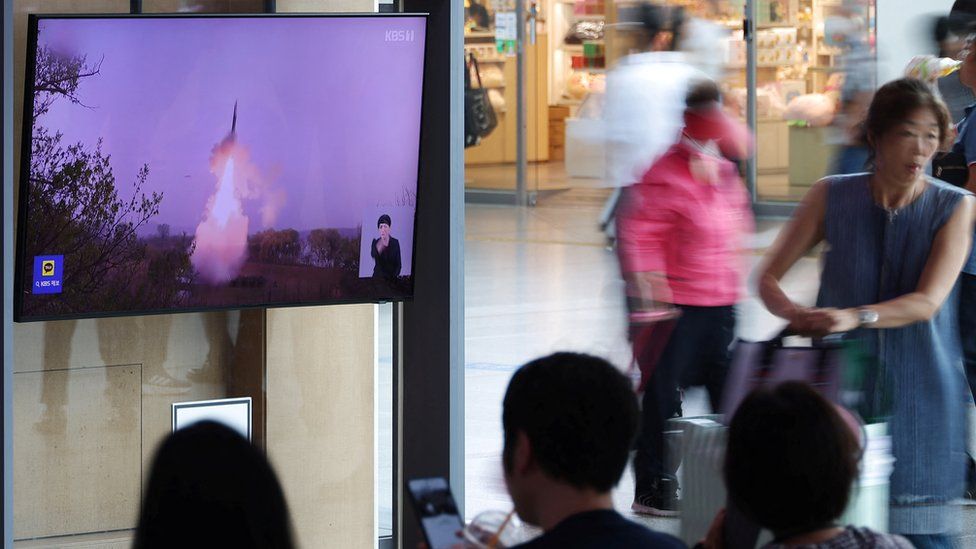North Korea Fires Suspected Intercontinental Ballistic Missile, Raising Security Concerns
Seoul, South Korea – North Korea has launched a suspected intercontinental ballistic missile (ICBM), according to reports from Japanese and South Korean officials. The long-range missile flew for over an hour before landing in the sea west of Japan on Wednesday morning.
The missile launch comes after North Korea threatened retaliation against what it claimed were recent US spy plane incursions over its territory. Earlier this week, the country also threatened to shoot down such planes. However, Washington has dismissed these accusations, stating that its military patrols are in accordance with international law.
Security concerns have been escalating on the Korean peninsula this year following North Korea’s testing of new weapons. The country conducted a record number of missile launches in 2022, including ones capable of reaching US territory. In response, the US and South Korea have increased their joint military drills around the peninsula.
Pyongyang has continued with its missile launches, testing a new ICBM in April, which it described as its “most powerful” missile to date. In May, the country attempted to launch a spy satellite, but the mission failed.
The missile launched on Wednesday flew eastwards from Pyongyang for more than an hour before landing in the sea west of Japan, covering a distance of 1,000km (621 miles), according to South Korea’s military. The Japanese Coast Guard reported that the missile landed short of Japanese waters.
Following the launch, South Korean and US officials met and issued a statement reaffirming their “strengthened” joint defense. The South Korean Joint Chiefs of Staff strongly condemned North Korea’s launch, describing it as a “grave provocative act” that violates UN Security Council resolutions and harms the peace and stability of the Korean peninsula and the international community.
South Korean President Yoon Suk-yeol convened an emergency meeting of his national security council from Lithuania, where he is attending the NATO summit.
North Korea’s previous launch occurred in mid-June when it fired two short-range ballistic missiles in response to US and South Korean drills. The country’s last ICBM test took place in February.
ICBMs are particularly concerning due to their long range, including the potential to reach mainland United States. In November 2022, when Pyongyang tested an ICBM, it fired it at a high-angle, short-range trajectory. However, the Japanese government stated that if the missile had been fired at a lower trajectory, it could have reached the US mainland.
The missile launch on Wednesday follows heated rhetoric from North Korea, warning the US to stop its air patrols and proposing a visit by a nuclear submarine to Korean waters. On Monday, Kim Yo-jong, the powerful sister of North Korean leader Kim Jong Un, accused a US surveillance plane of violating North Korea’s airspace and warned of “shocking” consequences if such flights continued.
Experts believe that North Korea inflates external threats to rally domestic support and justify weapons tests. They also note that Pyongyang often times its launches to disrupt diplomatic coordination against it. This is particularly relevant as South Korea and Japan leaders were scheduled to meet on the sidelines of the NATO summit.
Despite UN sanctions, Kim Jong-Un has repeatedly vowed to increase his country’s production of nuclear warheads and develop more powerful weapons. Analysts anticipate that the latest North Korean hardware will be showcased in late July during the country’s celebration of the anniversary of the Korean War armistice, known as Victory Day.

What measures are being taken by South Korea and the US to address the escalating security concerns on the Korean peninsula due to North Korea’s continuous testing of new weapons
Olutions.
The recent launch of a suspected intercontinental ballistic missile (ICBM) by North Korea has raised security concerns among neighboring countries. According to reports from Japanese and South Korean officials, the long-range missile flew for over an hour before landing in the sea west of Japan on Wednesday morning.
This missile launch comes as a response to North Korea’s claim of recent US spy plane incursions over its territory. North Korea had threatened retaliation and even the shooting down of such planes. However, the US has dismissed these accusations, stating that its military patrols are conducted within international law.
Security concerns have been escalating on the Korean peninsula due to North Korea’s continuous testing of new weapons. The country has conducted a record number of missile launches this year, some with the capability to reach US territory. In response, the US and South Korea have increased joint military drills in the region.
Earlier this year in April, Pyongyang tested a new ICBM, claiming it to be its “most powerful” missile to date. In May, the country attempted to launch a spy satellite, but the mission failed.
The missile launched on Wednesday flew eastwards from Pyongyang, covering a distance of 1,000km (621 miles) before landing in the sea west of Japan, according to South Korea’s military. The Japanese Coast Guard reported that the missile fell short of Japanese waters.
In response to the launch, South Korean and US officials held a meeting and released a joint statement reaffirming their “strengthened” joint defense. The South Korean Joint Chiefs of Staff strongly condemned North Korea’s actions, describing it as a “grave provocative act” that violates UN Security Council resolutions.



This recent missile launch by North Korea not only heightens security concerns but also calls for international collaboration to address this escalating threat.